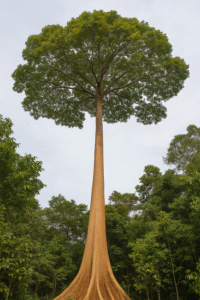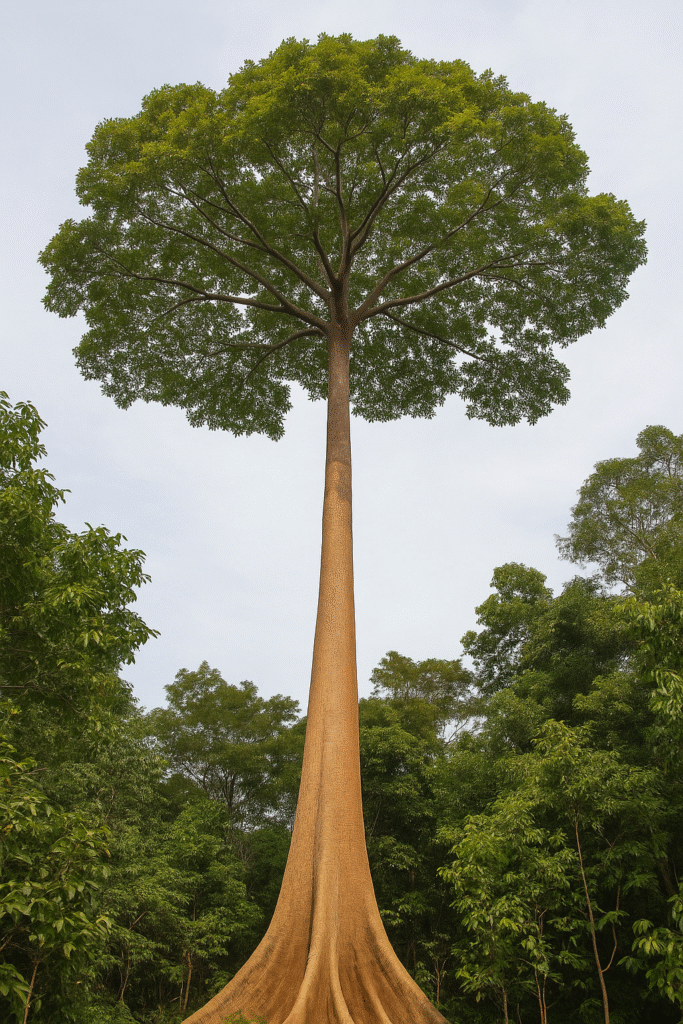The Tatajuba, scientifically known as Bagassa guianensis, is a towering tree native to South America, especially abundant in the Amazon region of Brazil, French Guiana, and Suriname. While it may not be as famous as some other rainforest species, Tatajuba is among the most valued trees due to its strong wood, fast growth, and ability to thrive in degraded environments.
In this article, we’ll explore the key features of Tatajuba, its ecological role, commercial uses, and fascinating traits that make it a true treasure of the tropical forest.
Key Characteristics of Tatajuba
Tatajuba is a large tropical tree, growing between 25 to 40 meters (82 to 130 feet) tall, with trunk diameters exceeding 1 meter in mature specimens. Its straight and cylindrical trunk makes it ideal for industrial use. The bark is grayish and rough, while its leaves are simple, dark green, and alternately arranged.
During flowering, the tree produces small yellow flowers that attract pollinating insects. Its fruits are capsules that split open to release seeds, aiding in natural regeneration.
Premium Hardwood
Tatajuba wood is extremely durable and naturally resistant to pests, termites, and weathering. These properties make it ideal for:
-
Construction (beams, flooring, structural supports)
-
High-end carpentry
-
Rustic and luxury furniture
-
Boatbuilding
-
Railway sleepers
-
Outdoor structures (decks, pergolas, poles)
When freshly cut, Tatajuba wood has a golden-brown color that darkens over time into an elegant deep brown. The wood is also easy to sand, polish, and work with hand or power tools.
Ecology and Reforestation
Tatajuba is a pioneer species, meaning it can grow in poor, degraded soils, playing a key role in forest restoration. It is frequently used in reforestation programs across the Amazon to rehabilitate deforested areas.
Additionally, the tree attracts birds and wildlife, contributing to biodiversity. Its relatively fast growth makes it a sustainable option for forest management, reducing exploitation of endangered species.
Interesting Facts about Tatajuba
-
Name origin: The name “Tatajuba” comes from the Tupi language. Some Indigenous communities also call it “Tatajubarana,” emphasizing its majesty.
-
Natural resin: The tree produces a resin used in traditional varnishes and natural sealants.
-
Rapid growth: Under ideal conditions, it can grow more than 2 meters (6.5 feet) per year during its early stages.
-
Market value: Due to increased demand and deforestation control, Tatajuba wood is gaining popularity in sustainable timber markets.
Cultivation and Growth
Planting Tatajuba is relatively simple, especially in tropical regions:
-
Climate: Warm, humid (tropical)
-
Soil: Deep and well-drained
-
Spacing: Typically 3×3 meters in commercial plantations
-
Care: Weed control during early years and periodic pruning
Its resilience and adaptability make it a popular choice among reforestation projects and agroforestry systems.
Economic Importance
Tatajuba is gaining recognition in both domestic and international hardwood markets, including Europe and North America. Because of its strength, appearance, and long lifespan, its wood commands high prices, especially when sustainably harvested and certified.
As a result, Tatajuba cultivation presents a valuable income opportunity for small and medium rural producers, particularly in Amazonian regions.
Conclusion
Tatajuba is a strong, majestic, and ecologically important tree. Its role in forest recovery, coupled with the high quality of its wood, makes it one of the most promising native species in tropical forestry. Whether you’re an environmentalist, a carpenter, or simply a lover of the rainforest, Tatajuba deserves your attention and respect.

✅ Must-Have Tool for Forestry, Gardening, or Outdoor Work!
🌳 Folding Hand Saw – For Tree Pruning, Camping, Gardening, Hunting
Compact, lightweight, and razor-sharp, this folding saw is perfect for those working with trees like Tatajuba. Easily cuts through wood, PVC, or even bone. Features an ergonomic anti-slip handle and folds securely, making it a great addition to your toolkit or camping gear.
🌿 Discover the Healing Power of the Brazilian Jatobá!
The Jatobá do Cerrado is more than just a tree — it’s a symbol of resilience, rich in medicinal benefits and deeply rooted in Brazilian tradition. Learn about its unique properties, cultural relevance, and why it’s considered a botanical treasure of the Cerrado biome.

